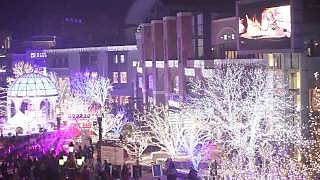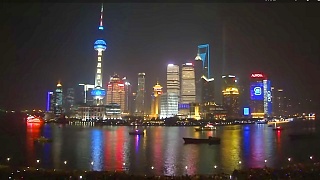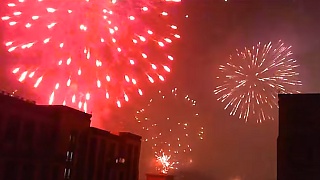The Chinese New Year is also known as the Spring Festival. The Spring Festival (also known as the Chinese New Year) is the most important festival for the Chinese people and is when all family members get together, rather like Christmas in the West. Nearly all people living away return home. Thus, this is the busiest time for all transportation systems, starting about two weeks before the Spring Festival itself. The Spring Festival falls on the 1st day of the 1st lunar month, usually about one month later than the Gregorian calendar. Generally, late January to early February. The Spring Festival originated during the Shang Dynasty (c. 1600 BC - c. 1100 BC) from the people's sacrifice to gods and ancestors at the end of an old year and the beginning of a new one. The most important days are Spring Festival Eve and the first three days. The Chinese government has stipulated that people have seven days off for the Lunar New Year. Many customs accompany the Spring Festival. Before the New Year, there are many preparations. Store owners are busy then as everybody goes out to purchase necessities for the New Year. These include fruit, candies and various types of nut. What's more, various decorations, new clothes and shoes for children as well as gifts for the elderly, friends and relatives, are all on the list for purchasing. Also, people completely clean both the indoors and outdoors of their homes as well as their clothes, bedclothes and all utensils. Then people begin decorating their clean rooms featuring an atmosphere of rejoicing and festivity. Doors will be pasted with Spring Festival couplets, highlighting Chinese calligraphy with black characters on red paper. The content varies from house owners' wishes for a bright future to good luck for the New Year. Also, pictures of the god of doors and wealth will be posted on front doors to ward off evil spirits and welcome peace and abundance. The Chinese character "fu" (meaning blessing or happiness) is a must. The character put on paper can be pasted normally or upside down, for in Chinese the "reversed fu" is homophonic with "fu comes", both being pronounced as "fudaole." What's more, two big red lanterns are often raised on both sides of the front door. Red paper-cuttings can be seen on window panes and brightly colored New Year paintings with auspicious meanings may be put on the wall. People attach great importance to the eve of the Spring Festival. All family members will eat together a meal more luxurious than usual. Dishes such as chicken, fish and bean curd cannot be excluded, for in Chinese, their pronunciations, respectively "ji", "yu" and "doufu", mean auspiciousness, abundance and richness. In recent years, the grand Spring Festival party broadcast on China Central Television (CCTV) is essential entertainment for the Chinese, both at home and abroad. According to custom, each family will stay up to see in the New Year. On New Year's day, everybody dresses up. First, they extend greetings to their parents. Then each child will get money as a New Year gift, in a red envelope. People in northern China will eat JiaoZi, or dumplings, for breakfast, as they think "jiaozi" in sound means "bidding farewell to the old and ushering in the new". Also, the shape of the dumpling is like a gold ingot from ancient China. So people eat them and wish for a prosperous year ahead. Southern Chinese eat NianGao (New Year cake made of glutinous rice flour) on this occasion, because as a homophone, NianGao means "higher and higher, one year after another." The first five days after the Spring Festival are a good time for relatives, friends and classmates as well as colleagues to exchange greetings, gifts and relax, indoors and out. The lively atmosphere not only fills every household, but permeates to streets and lanes. A series of activities such as lion dancing, dragon dancing, lantern festivals and temple fairs will be held for days. Setting off fireworks is a common custom during the Spring Festival. It is thought that the loud bangs could help drive away evil spirits. The Spring Festival then comes to an end when the Lantern Festival is finished. China has 56 ethnic groups. Minorities celebrate their Spring Festival almost the same day as the Han people, although they have some different customs. More information on the Chinese New Year :






http://www.chinaculture.org/gb/en_focus/node_2431.htm
http://gochina.about.com/od/chinesenewyear/p/ChineseNYGuide.htm
Chinese New Year (CNY), also known as the Spring Festival, is the most important traditional holiday in China, marking the beginning of the lunar new year. It is celebrated by Chinese communities around the world, as well as in other East Asian countries such as Taiwan, Singapore, and Malaysia. Here's an overview of Chinese New Year and its traditions:Timing and Duration:
Lunar Calendar: Chinese New Year follows the lunar calendar, with the date falling between late January and mid-February each year. The exact date varies because it is based on the lunar phases.
Festival Period: The celebrations typically last for 15 days, beginning on the eve of Chinese New Year and ending with the Lantern Festival on the 15th day of the lunar calendar.
Traditions and Customs:
Family Reunions: Chinese New Year is a time for families to come together and celebrate. Many people travel long distances to reunite with their relatives, leading to the largest annual human migration in the world, known as Chunyun.
Cleaning and Decoration: In the days leading up to Chinese New Year, families clean their homes to sweep away bad luck and make way for good fortune. They also decorate their homes with red lanterns, couplets (duilian), and paper cutouts featuring auspicious symbols.
Chinese New Year's Eve Dinner: The New Year's Eve dinner, known as 'reunion dinner' (??? tu�nni�nf�n), is a lavish feast shared with family members. Traditional dishes include fish (symbolizing prosperity), dumplings (symbolizing wealth), and various other symbolic foods.
Red Envelopes (Hongbao): Red envelopes containing money are given as gifts during Chinese New Year, especially to children and unmarried individuals. The red color symbolizes good luck and wards off evil spirits.
Fireworks and Firecrackers: Fireworks and firecrackers are set off at midnight on New Year's Eve and throughout the festival period to scare away evil spirits and bring good luck.
Lion and Dragon Dances: Colorful lion and dragon dances are performed in streets, parks, and public squares to bring prosperity and good fortune to communities.
Zodiac Animals:
Each Year is Associated with an Animal: Chinese New Year is symbolized by one of the 12 animals in the Chinese zodiac cycle. Each animal is believed to influence the personality traits and destiny of individuals born in that year.
Travel and Celebrations:
Spring Festival Gala: The Spring Festival Gala, broadcasted on Chinese television on New Year's Eve, features a variety of performances, skits, and musical acts. It is one of the most-watched television programs in the world.
Temple Fairs: Traditional temple fairs are held throughout China during Chinese New Year, offering food stalls, performances, games, and cultural activities for visitors to enjoy.
Chinese New Year is a time of joy, reunion, and renewal, filled with rich traditions and customs that have been passed down through generations. It is a celebration of family, community, and the arrival of spring, marking a fresh beginning and the promise of prosperity in the year ahead.
 The Chinese New Year
The Chinese New Year



















